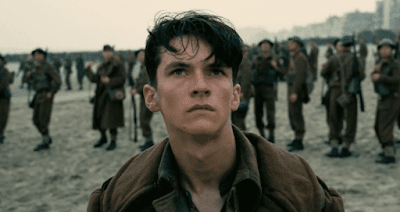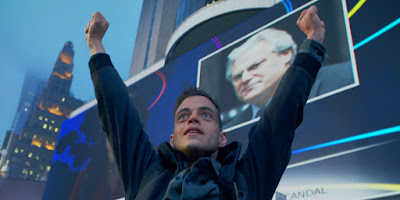Movie Review: Dunkirk
From director Christopher Nolan, whose highly-ambitious craft has garnered him plenty of acclaim with films like the mind-bending heist noir of Inception and the enthralling Dark Knight trilogy, comes yet another first for the talented filmmaker. With Dunkirk diving into one of the most fascinating facets of the Second World War, Nolan lent his mind to history to tell a bold and intense story of withering humanity. Reeling in a cast of impressive newcomers, and packing in a plot of simmering tension throughout, Dunkirk makes for another impressive effort from a director who knows exactly how to play his cards.
On the beaches, at sea, and in the air, the toils of men can be felt throughout the world as the Second World War burns on. In the summer of 1940, following the invasion of France by Nazi Germany, nearly 400,000 British and French forces are left stranded on the shores of Dunkirk. Fixed into rigid lines stacked on the beaches and on makeshift piers, thousands of men face the sea, waiting to be killed or rescued before the enemy arrives. With German forces looming overhead, only the miraculous saviors of the sky can shift the chances of survival for the men marooned in the sand. Three interwoven tales detail the horrors and hysteria of the time: one valiant mariner piloting his vessel into the jaws of war, a British Spitfire pilot careening over seas of oil and death, and the young men anxiously trudging through the sand and saltwater, eagerly seeking home.
At first glance, the tenth feature film from visionary director Christopher Nolan might not appear to be his most ambitious piece of work, especially after tackling such a far-reaching space epic as 2014's Interstellar. A war film set within an era that's exploded across the silver screen for decades now, what could possibly make Dunkirk any different? That being said, Nolan's Dunkirk might be one of the filmmaker's most experimental pictures to date. With his career kicking off with his breakout noir hit Memento, Nolan expressed right from the start a unique eye for storytelling. His tendency towards challenging the minds of his audience continued as he bent expectations with films like Inception and his Dark Knight trilogy, effectively blurring the lines between genres and how stories can be spun. With Dunkirk, Nolan worked to deceive expectations once more. Methodically maneuvering around its quick runtime, the film tossed the audience into a wave of moving parts. As the story followed a trio of perspectives, each in their own battle for survival, the film quickly became an exploratory set-piece of humanity and the multiple tension-filled facets of war.
While it might never become as ambitious or groundbreaking as his earlier films, Dunkirk was still a phenomenal piece of cinema from Christopher Nolan. With its layered structure becoming one of the many hallmarks of the film, Dunkirk sent you down three interwoven storylines that worked for the most part to keep you on edge. Cutting between the nerve-wracking perils of teenage boys on the shores of France, and the frantic hysteria of Spitfire aircrafts locked in battle, Nolan built his masterful tension primarily though the film's nonlinear structure. As the film began its story through the eyes of a young British soldier in newcomer Fionn Whitehead, it quickly tossed you right into the action. Bombs dropping on the beaches of Dunkirk nearly every second, the film wasted no time establishing its feverish tension. With Nolan's signature quick-cutting between scenes at work here, the film dropped you from location to location with graceful readiness. Even if the film's swaying timeline might get confusing at times, the suspense fueled by the story's bleak atmospherics and limited dialogue made for an effective thriller with a sensational bite.
With the film's tense atmosphere remaining its most dynamic feature, the cast of Dunkirk was also a phenomenal addition. With Christopher Nolan's past work giving life to a number of fantastic performances from his often star-studded casts, from Christian Bale and Heath Ledger in the Dark Knight films to Leonardo DiCaprio in Inception, Dunkirk brought a much more intriguing display of performances from its thin cast of faces. While the film might have totted popular faces like Tom Hardy and Cillian Murphy as the lone Spitfire pilot and a shaken soldier rescued at sea respectively, the most fascinating members of the cast had to be its newcomers to the film genre. With 20-year-old Fionn Whitehead leading the show as Tommy, an anxious private who struggles to find a way off the hellish beach at the start of the film, the film also displayed some effective performances from Barry Keoghan, Aneurin Barnard, and surprisingly, former One Direction leading man Harry Styles. Teeming with a compelling mixture of arrogance and innocence, the young men at the heart of Dunkirk propelled the film to a level that felt undeniably true to the time.
 |
| Mark Rylance also shined as the heroic mariner who sails his vessel into the heart of the battle |
Remaining on the subject of the cast, one of the many things that made Dunkirk such a fascinating film was its reluctance towards drawing out its central characters and their backstories. While the film does boast a number of great actors in its line-up, it never elevated a single character into the spotlight. With the film keeping its dialogue to a noticeable minimum throughout, Nolan kept his characters for the most part as simply nameless survivors of an unforgiving war. Never dwelling too long on who this character is, or why he is here, the film painted its characters in a way that kept the audience invested in the perils of these men, while never losing them to overwhelming amounts of exposition. While pushing forward compelling characters with their own humanity and identity might work for other war films like Saving Private Ryan, Nolan retained a great sense of ambiguity when portraying his palette of victims and survivors.
As the film oscillated between scenes of endearing tension and immersive action, it couldn't have possibly been the film it was without another brilliant musical score by composer Hans Zimmer. Packing even more unrelenting and propulsive sound into Dunkirk than he did in Inception and Interstellar, Zimmer crafted yet another spine-tingling score to couple perfectly with Nolan's impeccable design. With the score's signature ticking clock counting down every moment of tension before the action ignited, the film's immersive nature felt even more real as the sounds of incoming terror ran parallel to the blaring yet beautiful instrumentals Zimmer is known for.
Overall, while Dunkirk might not elevate beyond the ambitious stories of some of Nolan's past works, the director's articulate craft is undeniably evident in his first dive into the war film genre. With the film trading ultra-violence and overly-fleshed-out characters for bleak atmospherics and profound tension, Nolan favored showing the audience the anxieties of the unknown, rather than the cruelty of the familiar and the vicious. Delivering nameless faces that helped display the withering innocence and morality at the heart of war, Nolan's Dunkirk was a tension-filled thriller at a scope that felt sincere and emotional, even as it climbed to the level of a breathtaking cinematic experience.
I gave Dunkirk an 8 out of 10 for its breathtaking cinematography and direction, its push towards storytelling with visual elements rather than simply dialogue, and its propulsive score that elevated the film's immersive atmospherics beyond that of your average war thriller.






Comments
Post a Comment